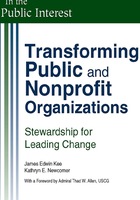
SUGGESTED READINGS ON TRANSFORMATIONAL STEWARDSHIP
James MacGregor Burns, Transforming Leadership. New York: Atlantic Monthly Press, 2003.
Burns won the Pulitzer Prize for Leadership (New York: Harper and Row, 1978), and this book represents his latest thinking on the subject of transformational leadership. He focuses on how leaders can evolve from being “transactional” deal makers to dynamic agents of major social change who can energize and empower their followers. Burns provides an historical view of the evolution of American thinking on leadership. He includes such important topics as followers as leaders, moving from engagement to empowerment, the use of power, the importance of “transforming values,” and how to put leadership to work on the world’s most difficult problem—global poverty.
Robert K. Greenleaf, Servant Leadership: A Journey into the Nature of Legitimate Power and Greatness. New York: Paulist Press, 1977, 2002 (25th anniversary edition).
Greenleaf has changed leadership thinking from the leader’s actions over others to the notion of service as the hallmark of effective leadership. He argues that leaders must become attentive to the highest priority needs of followers; in doing so, they will make their organization successful. Greenleaf lays out the concept in a convincing, practical style, with case studies from business, education, foundations, and charities. The 25th anniversary edition contains a thoughtful foreword by Stephen Covey. A complementary book that applies the servant-leadership concepts to everyday management situations is James Autry’s The Servant Leader: How to Build a Creative Team, Develop Great Morale, and Improve Bottom-Line Performance (New York: Three River Press, 2001).
Peter Block, Stewardship: Choosing Service over Self-Interest. San Francisco: Berrett-Koehler Publishers, 1996.
Supportive of Greenleaf’s notion of servant leaders, Block’s concept of “stewardship” calls for rethinking the role of the leader from that of “patriarchy” to “partnership,” which involves the redistribution of power, purpose, and wealth within the organization. Block uses business case studies; however, the concepts are equally (perhaps even more) important for public and nonprofit leaders. Block calls for a radical reengineering of work processes that support a decentralized decision-making and production structure.
Pauline Graham, editor. Mary Parker Follett: Prophet of Management. Washington DC: Beard Books, 2003 (first published in 1995).
The author brings together the writings of Mary Parker Follett, an organizational theorist of the early 20th century whose views on leadership, authority, delegation, empowerment, and constructive conflict have served as the foundation for many of today’s leadership scholars. Follett’s concepts (such as “power with” instead of “power over” and “integration”) continue to provide fresh insights for addressing today’s leadership dilemmas.